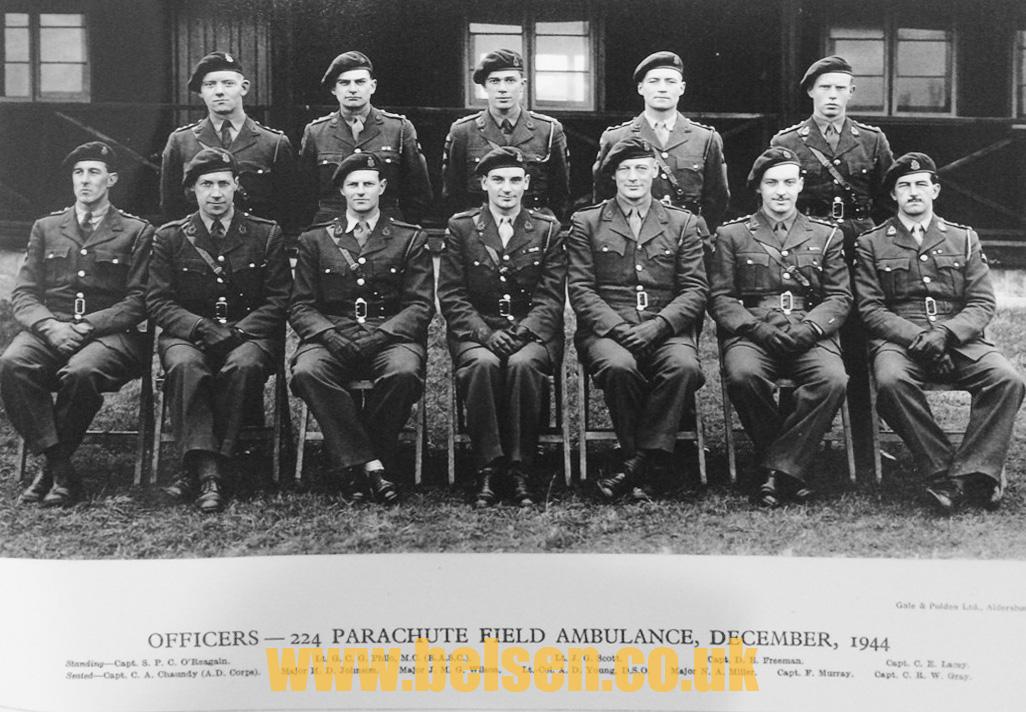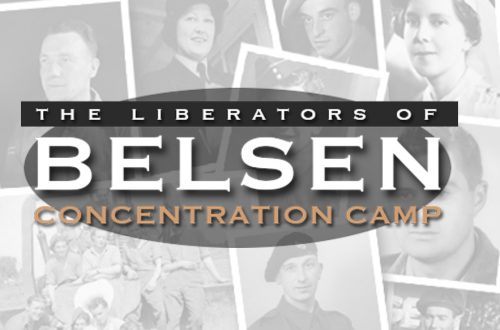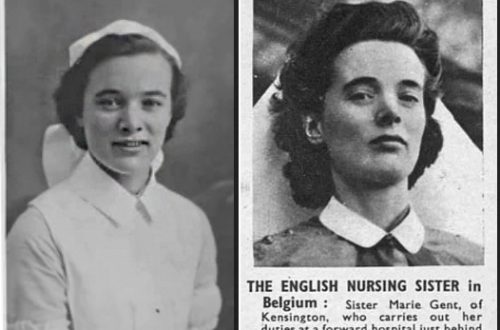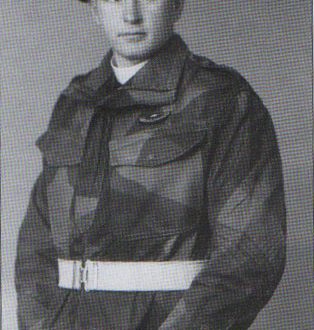Major N.A. Miller – 224th Parachute Field Ambulance, RAMC
My grandfather, Nathaniel Miller FRCS (Fellow of the Royal College of Surgeons) was a doctor in peacetime, and during WWII became a Major in the Royal Army Medical Corps (a British Army specialist corps providing medical services to all British Army personnel and their families in time of war and peace). This photo (below) hangs on my wall at home, taken in December 1944, several months after their unit’s involvement in the D-Day landings and Pegasus Bridge (a story for another day) and taken 5 months before the liberation of Bergen-Belsen. My grandfather is third from the right, front row, Major N.A. Miller.
On 15 April 1945 Major Miller headed the medical team that first went into Bergen-Belsen. Below is the army description of the situation found, in efficient military language, taken from the archives of 224th Parachute Field Ambulance, Royal Army Medical Corps, of which unit he was a senior officer:

Additional names: Back row, L to R:
Capt. S.P.C O’Reagain, Lt. Gordon Charles George Philo MC (RASC), Lt. J.G. Scott, Capt. D.E. Freeman, Capt. C.E. Lacey.
Front Row: Capt CA Chaundy, (AD Corps) (KIA March 1945 – see below), Major H.D. Johnson, Major J.M.G. Wilson, Lt-Col Alastair Donald Young, D.S.O., Major N.A. Miller, Capt F Murray, Capt. C.R.W. Gray.
Charles Anthony Chaundy. AD – Army Dental Corps
Service No. 118328
Killed 24 March 1945
Age 29 years old
***
SUBJECT: BELSEN Concentration Camp.
Ref. No. Med/16.
To: OC 224 Para Fd Amb
From: ADMS 6 Airborne Div
INFORMATION
1. In the general area of BELSEN 4867 there is a Concentration Camp containing approximately 60,000 prisoners. These prisoners are partly political and partly criminal. They are accommodated in two camps:
Camp ONE at 477658 is enclosed with barbed wire.
Camp TWO at 483675 is an ordinary unfenced hutted camp.
There is a supply depot for these at 482691 and hospitals (one of which is, however, at present a normal military hospital) at 459676, 473678 and 484682.
2. The guard at the camp consists of a unit of approx 700 Hungarians (complete with families), a proportion of Wehrmacht tps and certain SS Guards. There are also a Wehrmacht Adm HQ at the Commandantur and SS Adm Tps (cooks, storekeepers and book-keepers).
3. Disease has for some time been a considerable problem but the loss of the electricity (which comes from STROMVERSORGURGSVERBAND OST-HANOVER, CELLE, BAHNOPS-PLATE 9) and consequently lack of adequate water has led to a serious outbreak. There are at present 9,000 sick:-
Typhus exantematious ….. 1,500
Normal Typhus ….. 900
Tuberculosis ….. 500
Gastric Enteritis ….. a very large number.
4. Is it essential that this area should be kept as free of our tps as possible and that the persons at present in the concentration camp should be kept there till adequate arrangements can be made to sort them out – both from the point of view of preventing the spread of disease and preventing criminals breaking out.
5. Accordingly, in the interests of our own tps, the civil population and the Wehrmacht, certain negotiations were made with 1 Para Army. Details of the arrangement reached are at Appx ‘A’ and every effort will be made on the British side to carry these out. It is considered that from their own point of view the Germans have every intention of fulfilling their obligations to the best of their ability.
6. Units will ensure that all tps likely to go into the area are aware of the position and of the agreement reached. Tps will be instructed to uphold the authority of German and Hungarian guards and, if necessary, to render assistance. These guards will retain their arms and MT (incl 4 ancient and immobile DF tasks) and their orders and duties will be respected. It is thought that a serious risk of disturbance and attempts to break out will arise with the approach of the British tps.
7. As soon as operations permit the whole of the area concerned will be placed OUT OF BOUNDS to all British tps except on essential duty.
8. The necessary plans for taking over the administration and care of this camp and for the sorting of the prisoners are being made by 8 Corps and the sole responsibility of fmns is, so far as is humanly possibly, to respect the agreement given at Appx ‘A’ and to see that prisoners do NOT escape.
9. The name of the Military Commandant of BERGEN is Oberst [HAHRIES?] and of his Assistant Oberst SCHMIDT. On arrival of our tps they will be at the Commandantur ready to hand over their authority but to continue to carry out their task.
10. The supply situation is as follows:
(a) The Hungarian Tps (and families) have 4 weeks food.
(b) The German guard will be able to feed themselves.
(c) The prisoners have food for about 4 days but there is NO bread.
The Medical Stores are very short, in particular the following are required:
(a) Bandages.
(b) Disinfectants and Delousers.
(c) Washing and Laundry arrangements (incl soap).
(d) Digitalis, Tanalsin, heart stimulants.
(e) Vitamin Tablets.
On 14 April 1945, my grandfather was ordered by the Assistant Director of Medical Services to lead the medical team entering Bergen-Belsen the following day, on 15 April 1945:
METHOD
1. Major NA MILLER RAMC with Section Officer and complete Section from 224 Para Fd Amb (Section Offr preferably one who speaks German) will enter the camp at the earliest possible moment to assess the Medical position and organise the Medical services. 76 Fd Hygiene Section will accompany (instrs DDMS 8 Corps letter 8C/6632/M dated 13 Apr) and will be responsible for general hygiene and dusting of all personnel. If further medical assistance is required, Major NA MILLER will contact this Office immediately.
2. Electrical power will be required at the earliest possible moment. It is understood that the internal water supply is dependent on this and presumably water borne drainage.
3. Water – Pending restoration of normal services a RE Water Point producing 40,000 gallons per day may be required.
4. Laundry – A complete mobile bath and laundry unit will be necessary in the early stages pending restoration of water supply.
5. Food Supplies – It may be necessary to limit and modify in the early stages the food intake of personnel in a seriously starved condition or following disease. It is recommended that provision be made to have adequate quantities of available milk products brought to the area. Full PW scale of diet will almost certainly NOT be required until the end of a fortnight.
6. Clothing – No information but likely to be inadequate in scale, both personal and bedding.
7. AL 63 Mark III – large quantities will be required (6 tons).
8. Additional British Medical Staff may be required to assist in admin and reorganisation at a later date.
9. The amount of British Military Traffic throughout the area should be strictly limited to essentials. All personnel must be dusted with AL 63 Powder before entering the area.
10. Medical supplies – Local resources are being assessed now and should cover immediate requirements.
[Signed MacEwan] Colonel, A.D.M.S., 6 AIRBORNE DIVISION. BLA
14 Apr 45.
11,431 total views




